by Robin Mosley, Communications and Development Coordinator
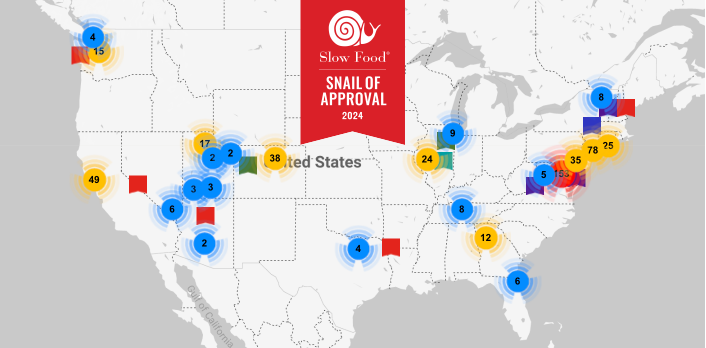
Have you ever wondered what it takes for a food and beverage business to earn the coveted Snail of Approval award from a Slow Food chapter? For a business to receive recognition, they must stand for the Slow Food principles of good, clean and fair food. It isn’t enough to simply make good food; from commitments to local communities to leading with values of antiracism and anti-oppression, each nominee goes through a rigorous evaluation process that determines how well they meet sourcing, environmental impact, cultural connection, community involvement, staff support and business values. While each chapter has a slightly different process, getting the Snail of Approval is great for awardees and the communities they serve. Here are Slow Food in Sonoma County, Olympia and Las Vegas’ experiences developing, evaluating and awarding the Snail of Approval to nominees.
Demystifying the process of how to apply for the Snail of Approval is built into the fabric of Slow Food’s core principles. At the national level, the Snail of Approval has an application for standardization, but from there, each chapter can choose how the evaluation goes. For chapters such as Slow Food in Sonoma County and Las Vegas, there’s an interview and a walkthrough to ensure what is said in the application matches with their everyday practice. Using a rubric they’ve adjusted from Slow Food Vermont, Slow Food in Sonoma County team of three “interviews the business owner, chef, or whoever it is that’s applying. We tour their business. We look at their walk-ins and we check out their pantries. We get to see everything they’re doing and not just hear what they’re doing.” Carol Diaz, Slow Food in Sonoma County’s Co-Chair of Communications, said. “If they pass with 83%, all based on good, clean and fair food, then they’re awarded.”
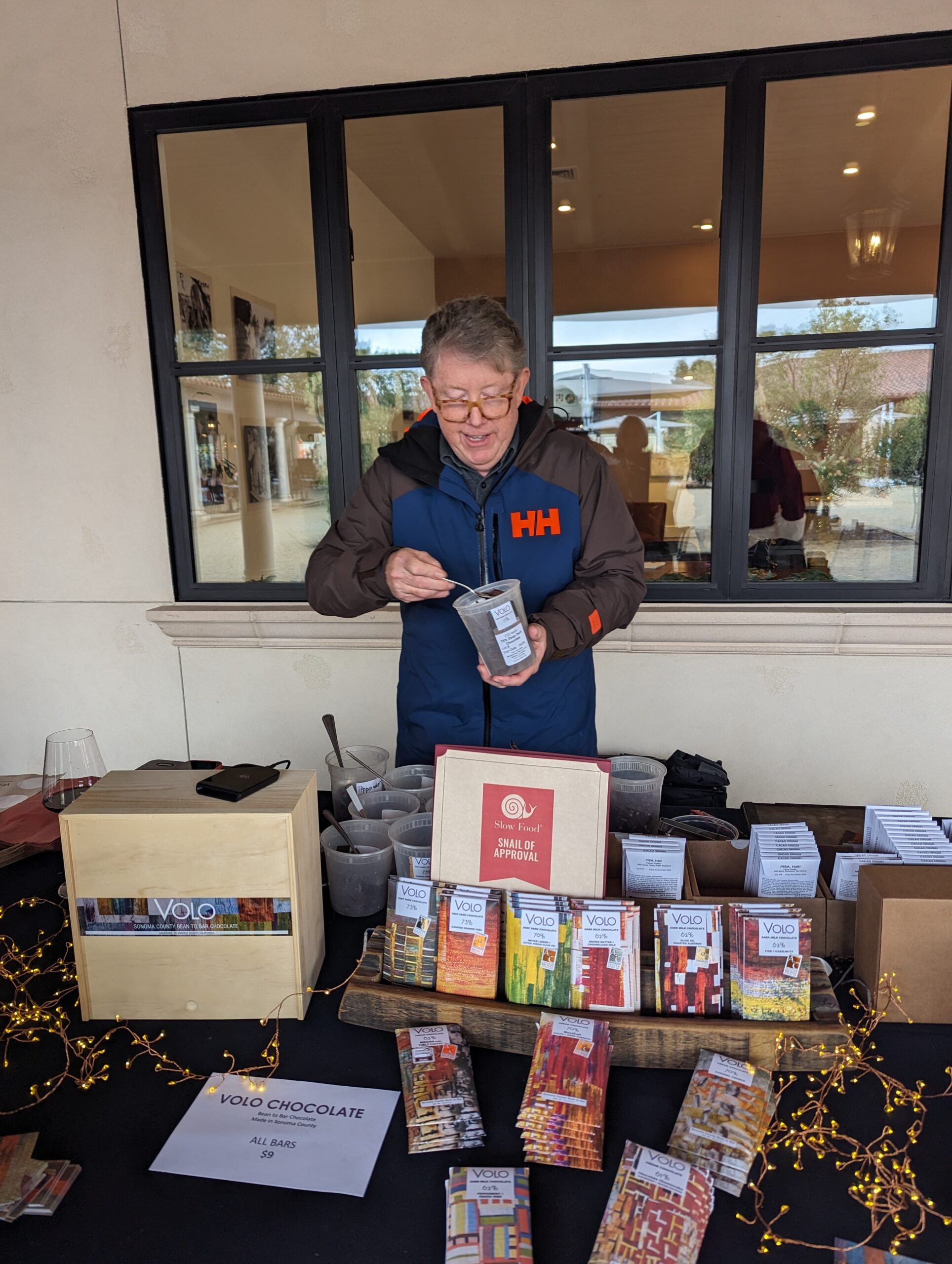
A newer chapter, Slow Food Las Vegas, led by Dr. Stephanie Pocchia, Founding Co-Chair and Policy Chair, and Keri Valentic Moore, Co-chair of Snail of Approval Awards and Communications Chair, is in its first year of Snail of Approval. Slow Food Vegas also interviews applicants and conducts site visits. What that chapter has focused on is having a clear process with transparency in the evaluation criteria. This all came from a former teacher, according to Stephanie. “She said we needed to be transparent with our process. This shouldn’t be anything that’s a surprise to people.”
With transparency and clear guidelines in place, food and beverage businesses can apply to get in the running for the award. What’s important to keep in mind for nominees is that not everything will have to be perfect to win. Yes, local food matters, but it is also complicated depending on the chapter location and the food or farming involved. In the case of Slow Food Greater Olympia, Jennifer Crain, Chair, explains that there is a Southern restaurant, The Wandering Goose, that isn’t 100% local, but they’re very intentional about where they get their ingredients for authenticity.
“They’re using almost all local ingredients, including ingredients from their farm. But they’ve carefully chosen a few key ingredients that they source from outside this region. They use a certain type of flour for their biscuits, for instance, made from soft winter wheat that they order by the half-palette from North Carolina.” Jennifer said. She continues, “And it’s the same with the sorghum syrup, which is made in Tennessee using a horse-drawn press. Those few ingredients give their biscuits and other goods that are essential to their cuisine the exact flavor they want. ”
The Las Vegas chapter also evaluates restaurants based on locally sourced ingredients, but Las Vegas is also judging based on intentionality because “There’s not enough farms to produce enough locally here in the county for all of our businesses. So we had to look at our community and what was realistic for our community.” Stephanie said. For example, Las Vegas is in a drought. This issue made it imperative for the Las Vegas chapter to adapt the criteria for evaluation, according to Stephanie. It’s difficult to grow in Las Vegas; there are barriers to the soil , as it has too much calcium in it.” Stephanie said.
To address the lack of locally-grown produce, the criteria also focuses on aspects such as making things from scratch using regionally-grown produce, eco-friendly utensil use, community engagement, and treatment of employees. There is a pizza restaurant, Yukon Pizza, a first-time Snail of Approval winner that uses a 126-year-old starter from their great-great-grandfather from Yukon, Alaska. They don’t use single-use plastics; they use aluminum cans for drinks, metal forks and knives; all plastic cups are reusable. Yukon also supports its community. “They’re located in a very low socioeconomic part of town, with a large homeless population. They welcome their unhoused community members by offering a free slice and water. To hear that was just so touching, so good, clean and fair,” Stephanie said. “They do have some fresh produce, of course. But their strengths are in other areas as well: their treatment of their employees and their work with other charities. They’re amazing.”
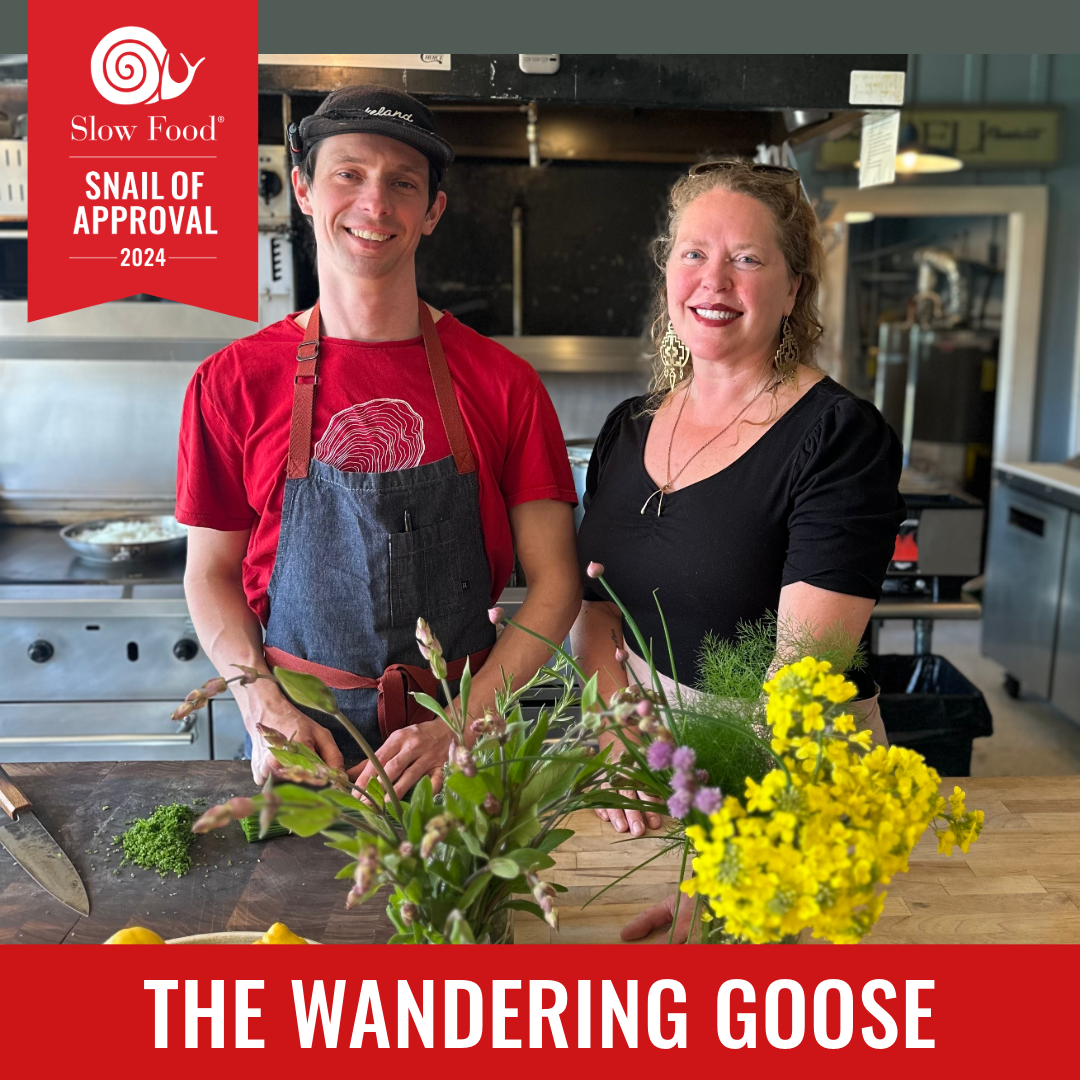
Another standout restaurant is one that Jennifer says is doing great work. “There is a restaurant called The Wandering Goose that is connected to a hotel over on the coast that we just approved. They checked all the boxes, and they have a great waste system.” She continues, “They barely waste any food. We wanted to find out more, like, ‘Where do your scraps go?’ And they said, ‘Oh, well, we have a pig on our farm, and we have chickens and separate piles that go to the pigs and the chickens. So they have a whole system worked out where they inform their staff where to dispose of food scraps based on where it will go.”
As an awardee, the benefits of the Snail of Approval are obvious in the case of exposure. While the business itself may be popular among a select few, getting vetted by a local chapter boosts visibility. Dani Garcia-White, co-owner of the aforementioned Yukon Pizza, applied for the Snail of Approval after being invited. After getting the Snail of Approval, Dani said that having the award hanging in the restaurant is a conversation starter. “We’re an open kitchen concept, so our customers can talk with us while we’re making pizza, which I love. So it’s a great conversation starter, because people don’t know what it is. They’re like, “What is the Snail of Approval?” So it’s been really great to use it as a way to inform people of not only Slow Food Las Vegas, but USA and international.”
This award also sparked conversations from fellow chefs from across the country. “We’ve had a couple restaurant owners from other places around the country come in and see, and say ‘Oh, I’ve been thinking of applying like, should I do it?’ It’s like, yes, absolutely.” The Snail of Approval piques community interest and serves as a networking tool, too.
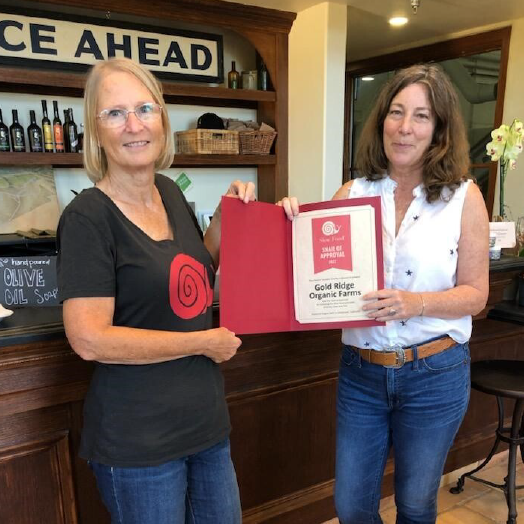
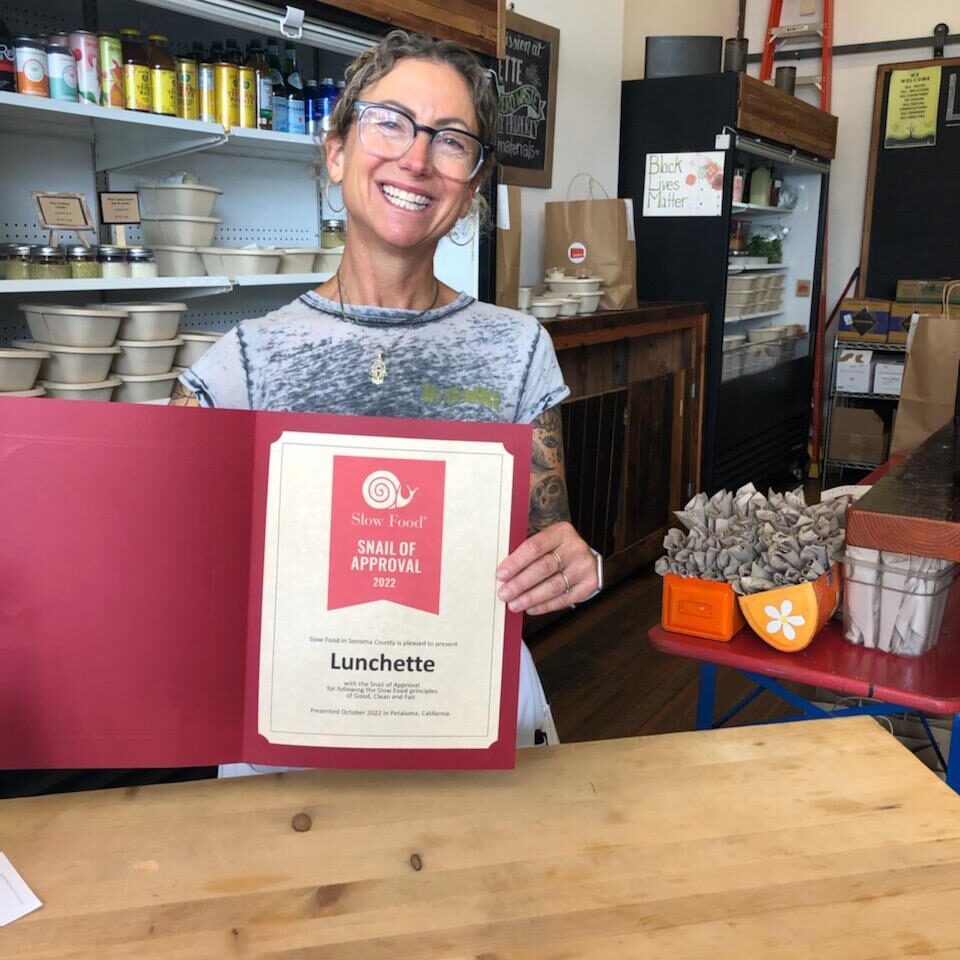
If there are any chapters considering starting a Snail of Approval program, Stephanie highly recommends attending Slow Food USA Snail of Approval community action team meetings virtually. Stephanie stresses, “You are not alone. The participants are generous with information on how they’ve developed their program. Any of us will share our documents to help you get started. Go to a meeting and just tell people you need help. It’s amazing.”
For businesses, Jennifer suggests taking a look at how you do things to determine the next steps. “How is it that you help? Do your employees have the best working conditions possible? Take a look at [your situation] and if you feel like you’re already doing a good number of those things, then apply,” Jenni said.
“If you feel like you have work to do, then pick a couple of [opportunity areas] and start making some changes, and even reach out to whoever your local chapter is,” Jennifer said. “It’s better for everyone. If businesses do this, it’s better for the planet. It’s better for workers and it’s better for consumers. It’s a win-win. It’s not just about getting a decal that can go on your window; it’s also about creating food that makes things better for everybody.”

